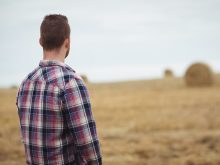Whitney Larson and her husband, Bart, have been practising no-till on their land to conserve moisture. Their farm in northwestern Kansas has experienced extreme drought for four consecutive years.
Their irrigation pivots have been the only saving grace for some of their crops, including corn, sorghum and winter wheat, which they grow near Sharon Springs, Kansas.
In mid-December when Whitney caught wind of a wildfire making its way across the state, she felt terrified that the fire would destroy their farm and home. Worse yet, Bart was away, and Whitney was alone with their three children, unsure of which way the fire would turn with 140 km-h winds blowing outside their home.
Read Also

Vintage power on display at Saskatchewan tractor pull
At the Ag in Motion farm show held earlier this year near Langham, Sask., a vintage tractor pull event drew pretty significant crowds of show goers, who were mostly farmers.
Related story in this issue: Campaign encourages farmers to ask for help
“It was awful. I didn’t handle it well,” she said.
Her oldest son, Bodie, was giving her a play by play, announcing everything that was happening outside, making her anxiety worse. She screamed at him to go downstairs. Paralyzed with fear, Whitney said she was in survival mode and didn’t know what to do.
Parents on the farm are sometimes forced to tackle high-stress situations like this and often with children in tow. Farm kids are often familiar with the word sacrifice and they are exposed to tough situations at an early age. How parents handle those hard moments can have an impact on their children’s mental health as well as help them to develop good coping strategies.
Luckily that December day, Larson’s homestead was spared, but many others in four different counties were not. Many were left with only ashes after 400,000 acres burned, hundreds of animals perished and two men died.
Larson said the day after the fire, she spoke with her son to apologize for lashing out and explained why she was so upset and explained that it was the circumstances that made her upset.
Farm counsellor Kim Moffat said this kind of real talk is the best thing parents can do to help farm kids work through hard times.
“Kids need parents to see when they are struggling and to be able to pick up on those things. That’s why communication is important and making sure the kids understand the reality of the farm, so the kids feel like they are part of the conversation. It increases their anxiety when parents are stressed out, but if they understand what is going on, they will know it is circumstantial. They are then able to digest and understand what is going on, instead of just feeling the upheaval of uncertain times.”
Important connections
Child psychologist Dr. Jody Carrington said meaningful connection is the best medicine to nourish the mental health of farm kids.
“We are at our best selves when we are surrounded by people who can help us through the hard stuff.”
That hard stuff can include not only wildfires or drought, but also tight finances, market variabilities, weather challenges or long hours.
“You, as the owner of that business, of that farm … are our number one priority. If you are not OK, those kids don’t stand a chance. You can’t tell your kids how to be successful business owners, including farmers, you have to show them.”
She added that modelling good mental health strategies for kids is as important as teaching them how to run a farm and she emphasized the importance of sleep, good nutrition and exercise.
Whitney tries to model good mental health strategies for her kids, and also models it for the world on her social media accounts.
“I started sharing about our farm to let others see just how hard we work, what this lifestyle means to us and to educate on the truths behind farming.”
Many times, that means snapping photos of her and three kids in the cab of a tractor when the work needs to get done.
“It is never easy to take your kids with you all the time. But we do and I pray the memories they have growing up are ones that they will cherish forever.”
Sharing the realities of farming is an important tool for mental health, said Carrington, who added that simply acknowledging someone might be the best thing you can do for them if they are struggling.
According to a submission to the House of Commons agriculture committee, farmers are struggling.
A national survey of farmers indicated that 45 percent of farmers had high stress, and 58 percent of them met the classification for anxiety, while 35 percent met the classification for depression.
It is a similar story in the United States.
However, the stigma surrounding mental health remains a barrier for farmers on both sides of the border.
“Three in four rural adults say reducing stigma about mental health in the agriculture community is important,” the American Farm Bureau’s 2020 findings show.
However, the bureau’s latest findings in 2021 show that younger rural adults are more likely than older rural adults to talk about their challenges and seek care from a mental health professional.
Carrington said cab rides like the ones Larson’s kids often experience can be the saving grace for not only farm kids, but also for parents and grandparents as well.
“It is more efficient or more effective to not have the kids out in the field. Yes. But it is good for everyone to have that connection. This needs to remain important and a priority. That doesn’t mean you can’t hire help, though, because the work still has to get done. If you know that getting help in the field or at home is going to make you a more connected mom (or dad), then do it,” she said.
“Ask yourself this: when I get home from the field and the laundry is done and the babies are tucked into bed, what kind of a (parent) am I when I wake up in the morning?”
Carrington agreed that changes in agriculture with ever-increasing farm size and greater distances between neighbours poses a great challenge to mental health in rural communities.
“The small family farm is being obliterated because of technological advances.”
If there are employees getting paid by the hour, important rituals that provide meaningful connection might be the first thing to go, things such as having supper on the tailgate or morning coffee.
She said spreadsheets are helpful to evaluate the bottom line, but farmers need to place value on the times that provide that meaningful connection, something that has no dollar sign attached to it.
Moffat said having a family meeting to talk about family values in a farming operation might be just as important or more important than talking about the logistics of the farm.
“As the farm gets bigger, there is going to be a trade-off for that … and it is recognizing that, and doing something about it,” she said.
She suggested that making family time should remain a priority.
“If it isn’t possible at busy times, it needs to take priority as soon as there is down time.”
Moffat, a psychiatric nurse, has worked as a crisis counsellor for 20 years. She helped farmers at the Manitoba Farm and Rural Stress Line before starting her own counselling practice. Most recently she helped to design a farmer wellness program that provides free one-on-one counselling to farmers and their families.
She said farm youth can face unique challenges.
“Isolation, loneliness and anxiety are the top three concerns I’ve seen. If you are a youth and you are under 16, you don’t have a driver’s licence, and you can’t drive yourself to get help, and you might not be comfortable with family members, and your auntie might work at the hospital in town.”
She said youth are often connected online, but she worries that those connections might not be enough.
Moffat said parents should watch if their kids are not keeping in contact with friends, or if they notice their kids are spending more time alone, or seem moody, irritable, or anxious.
“Sometimes the problems feel so big, that they can’t see a way forward. Sometimes, we have to take our mom and dad hat off and try to listen without reacting to what they are saying.”
Carrington agreed, saying the act of simply listening and acknowledging is the only way to achieve that sought after remedy: meaningful connection.
“We overestimate the amount of time that it takes to make sure our families are healthy.”
Decades ago, when houses were smaller and technology played a smaller role in our lives, connection was inevitable, she said.
“The square footage of our houses long ago were different than they are now. Before we were in each other’s faces, but now we have to make the effort to sit and be with each other. We are wired for connection. When we sit down and eat together, dance together, spend time together, have face-to-face interactions, even if we don’t talk to each other, our cortisol decreases, oxytocin and dopamine increase.”
Carrington said during busy times on the farm, it may not always be possible to see the kids face to face but a phone call can go a long way to connecting with them. Younger children might be easier to connect with than teenagers, but teens need just as much support.
Moffat said men often hide their struggles more than women.
“For a lot of men in the agricultural community, they weren’t socialized to talk about their feelings, and that is changing thankfully, but for a lot of men, they don’t have that language to talk about their feelings and so they do shut down and they don’t know how to express themselves. Women have been given the gift to communicate and articulate our feelings and it seems to come easier for us.”
Larson has noticed that her husband is more likely than she is to hide his struggles.
“The only way our kids can know what is real and what is not in this life is to be honest and open. I don’t hide that struggle. If they grow up thinking I never struggled, they will think something is wrong with them when they do … they need to know it is OK to mess up.”
Carrington said women have a big role to play when it comes to improving mental health on the farm.
“The future of farming is female,” she said because of the nurturing role women tend to take on. But that doesn’t mean dads and grandparents shouldn’t strive to do the same for the next generation.
“You can’t give away something you never receive,” Carrington said. “If nobody ever held your dad’s hand and said, do you know how much you matter, then he won’t be able to do that for other people.”
Whitney and Bart Larson are doing their best to grow three kids at the same time they grow their farm, learning that if they lose their cool sometimes, even if they don’t mean to, it can be a teachable moment.
“The only way our kids can know what is real and what is not in this life is to be honest and open. They know that animals don’t live forever. They know where and how their food gets to the table and they know we as parents have real feelings. I think these are all things that will set them up to grow as amazing farm kids.”
Lewellyn Melnyk is a former journalist turned grain farmer and author who farms near Angusville, Manitoba. She is currently penning a book on how to improve mental health in agriculture and can be found on Instagram or Twitter @LewellynMelnyk.















